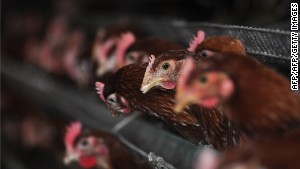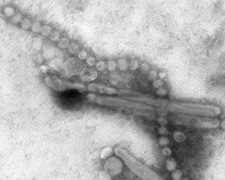H7N9 Avian Flu Outbreak cases now up to 108 Infected/22 Fatalities.
First known case outside of China in Taiwan.
"This is an unusually dangerous virus for humans, We think this virus is more easily transmitted from poultry to humans than H5N1."
Keiji Fukuda
Keiji Fukuda
 |
| Researchers have seen a "dramatic slowdown" in human cases after the closure of live poultry markets. |
Part of complete coverage on H7N9:
Tune in to Situational Preparedness Wednesdays on http://www.blogtalkradio.com/usaebn/2013/04/24/situational-preparedness
WHO: H7N9 virus 'one of the most lethal so far'
updated 7:14 AM EDT, Wed April 24, 2013
STORY HIGHLIGHTS
- NEW: First H7N9 bird flu case in Taiwan has been reported, health officials say
- Death toll from China's bird flu outbreak climbs to 22, with infections rising to 108
- WHO's Keiji Fukuda warns H7N9 is one of 'the most lethal flu viruses we have seen so far'
- Authorities struggling to understand virus which is mild in some cases but lethal in others
"This is an unusually dangerous virus for humans," Keiji Fukuda, WHO's assistant director-general for health, security and the environment told a news conference in Beijing Wednesday.
"We think this virus is more easily transmitted from poultry to humans than H5N1," he added, referring to the bird flu outbreak between 2004 and 2007 that claimed 332 lives.

Poultry markets closed over bird flu

China on high alert over bird flu

New deadly strain of bird flu in China
"This is definitely one of the most lethal influenza viruses that we have seen so far."
As investigations continue into the possible sources of infection, Fukuda warned that authorities were still struggling to understand the virus. The WHO said China must brace for continued infections.
Fukuda's warning came as Taiwanese health authorities said they've confirmed the first human case of H7N9 in Taiwan -- one they said was imported from China.
A 53-year-old Taiwanese man who worked in eastern China was confirmed to have H7N9 on Wednesday, the Taiwanese Centers for Disease Control said. His condition was described to be severe.
He had been traveling back and forth regularly between China's Jingsu province and Taiwan, health officials said.
"According to the case, he had not been exposed to birds and poultry during his stay in Suzhou (in Jingsu province) and had not consumed undercooked poultry or eggs," the Taiwanese CDC said.
Taiwanese health officials said they are screening travelers arriving from China for signs of H7N9.
Fukuda, meanwhile, said WHO officials "are at the beginning of our understanding of this virus."
"(The situation remains) complex, difficult and it is evolving," he said.
So far there is no evidence of sustained human-to-human transmission, the authorities say.
"We do want to note, however, that if limited person-to-person transmission is demonstrated in the future, this really will not be surprising," Fukuda warned, adding that it was critical to remain vigilant, monitoring the virus's spread and mutation.
Nature | News
Mapping the H7N9 avian flu outbreaks
Where are the 108 human cases confirmed so far, and where might the virus go next?
"We are not sure that the clusters were caused by common exposure to a source of the virus or were due to limited person-to-person transmission," he said. "Moreover we have not seen sustained person-to-person transmission."
While some elements of the outbreak have baffled investigators -- specifically why the virus tends to target an elderly demographic and the fact that it is asymptomatic or mild in some cases and lethal in others -- authorities have claimed some significant victories in the fight against a pandemic.
Anne Kelso, the director of a WHO-collaborating research center, said researchers had seen a "dramatic slowdown" in human cases in Shanghai after the city's live poultry market was shut on April 6. Describing the finding as "very encouraging," she said evidence suggests the closure of live poultry markets is an effective way to stop the spread of the virus.
This is an unusually dangerous virus for humans
Keiji Fukuda
Keiji Fukuda
The joint inspection team from China's National Health and Family Planning Commission and the World Health Organization also found that, so far, no migratory birds have tested positive for the virus, taking another worrying route of transmission out of the equation.
It said the H7N9 virus is only being found in chickens, ducks and pigeons at live poultry markets.
WHO officials said there are already efforts underway in other countries to develop a vaccine after Chinese officials admitted international help would be needed with this.
Meanwhile, the National Health and Family Planning Commission said in its daily update on H7N9 cases that a total of 108 H7N9 cases have been reported in China, including 22 deaths. Most cases have been confined to Shanghai and neighboring provinces in eastern China.
CNN's Ivan Watson and Feng Ke in Beijing contributed to this report.
H7N9 Outbreak Characterization- CDC

- H7N9 infections in people and poultry in China
- Sporadic infections in humans; many with poultry exposure
- No sustained or community transmission
- Investigation ongoing
H7N9 Images
Human infections with a new avian influenza A (H7N9) virus continue to be reported in China. The virus has been detected in poultry in China as well. While mild illness in human cases has been seen, most patients have had severe respiratory illness and some people have died. No cases of H7N9 outside of China have been reported. The new H7N9 virus has not been detected in people or birds in the United States.
An investigation by Chinese authorities is ongoing. Many of the people infected with H7N9 are reported to have had contact with poultry. However some cases reportedly have not had such contact. Close contacts of confirmed H7N9 patients are being followed to determine whether any human-to-human spread of H7N9 is occurring. No sustained person-to-person spread of the H7N9 virus has been found at this time.
Human infections with avian influenza (AI, or “bird flu”) are rare but do occur, most commonly after exposure to infected poultry (Bird-to-human spread). Limited person-to-person spread of bird flu is thought to have occurred rarely in the past, most notably with avian influenza A (H5N1). Based on this previous experience, some limited human-to-human spread of this H7N9 virus would not be surprising. Most important, however, is that this transmission not be sustained (ongoing).
Influenza viruses constantly change and it’s possible that this virus could become able to easily and sustainably spread between people, triggering a pandemic. CDC is following this situation closely and coordinating with domestic and international partners. CDC takes routine preparedness actions whenever a new virus with pandemic potential is identified, including developing a candidate vaccine virus to make a vaccine if it were to be needed. CDC also has issued guidance to clinicians and public health authorities in the United States, as well as provided information for people traveling to China. This is an evolving situation and there is still much to learn. CDC will provide updated information as it becomes available.
http://www.cdc.gov/flu/avianflu/h7n9-virus.htm
Welcome to FT.com, the global source of business news and analysis. Register now to receive 8 free articles per month.
A man in Taiwan has been diagnosed with H7N9 bird flu and is critically ill with the first case of the disease found outside of mainland China.
The 53-year-old Taiwanese man had been working in the Chinese city of Suzhou from the end of March to April 9, and began feeling feverish shortly after he returned home via Shanghai, according to a statement from Taiwan’s health department.
News that the disease has been found in travellers who had been in China comes as experts are watching closely for signs that the disease can be transmitted from person to person.
“This is an unusually dangerous virus for humans, one of the most lethal influenza viruses we have seen so far,” said Keiji Fukuda, a World Health Organisation official, at a briefing Wednesday in Beijing. He cautioned that researchers are still “at the beginning of understanding this virus.” People also appear to catch the disease from birds more easily than other variants of bird flu, according to the organisation.
So far, the WHO says, it does not seem to be transmitted easily between people. However, Chinese authorities last week said they were investigating evidence of infections in some families to see whether the disease has spread from person to person.
Taiwan has been particularly alert to spread of avian flu, as hundreds of thousands of Taiwanese businesspeople and Chinese tourists travel back and forth across the strait each month. The region of Suzhou, where the man had been travelling when he became ill, hosts a large number of factories owned by Taiwanese companies.
The patient in Taiwan told doctors that he had not had been in contact with live or uncooked birds or eggs. Taiwan authorities say they have notified and will be monitoring those people whom the patient came in contact with.
The virus has infected 108 people and killed 22 in mainland China as of Tuesday, according to authorities there.
Taiwan was hit hard by the SARS virus that originated in China and swept across Asia in 2003. For Taiwan, combating that disease had been particularly tricky as its unusual political status – China claims it as territory, and few states have diplomatic ties with it – meant it had difficulty working with the WHO and Beijing to get information and tests for the disease.
Since then, relations between Taipei and Beijing have improved, and public health officials from Taiwan recently visited the mainland to study the development of H7N9 and begin research on possible vaccines.
With additional reporting by Leslie Hook and Li Wan in Beijing



The 53-year-old Taiwanese man had been working in the Chinese city of Suzhou from the end of March to April 9, and began feeling feverish shortly after he returned home via Shanghai, according to a statement from Taiwan’s health department.
More
On this story
- China warns of human bird flu transfer
- Beyondbrics Bird flu gives business a cold
- Bird flu spreads beyond eastern China
- Bird flu fears close China poultry markets
IN Asia-Pacific
“This is an unusually dangerous virus for humans, one of the most lethal influenza viruses we have seen so far,” said Keiji Fukuda, a World Health Organisation official, at a briefing Wednesday in Beijing. He cautioned that researchers are still “at the beginning of understanding this virus.” People also appear to catch the disease from birds more easily than other variants of bird flu, according to the organisation.
So far, the WHO says, it does not seem to be transmitted easily between people. However, Chinese authorities last week said they were investigating evidence of infections in some families to see whether the disease has spread from person to person.
Taiwan has been particularly alert to spread of avian flu, as hundreds of thousands of Taiwanese businesspeople and Chinese tourists travel back and forth across the strait each month. The region of Suzhou, where the man had been travelling when he became ill, hosts a large number of factories owned by Taiwanese companies.
The patient in Taiwan told doctors that he had not had been in contact with live or uncooked birds or eggs. Taiwan authorities say they have notified and will be monitoring those people whom the patient came in contact with.
The virus has infected 108 people and killed 22 in mainland China as of Tuesday, according to authorities there.
Taiwan was hit hard by the SARS virus that originated in China and swept across Asia in 2003. For Taiwan, combating that disease had been particularly tricky as its unusual political status – China claims it as territory, and few states have diplomatic ties with it – meant it had difficulty working with the WHO and Beijing to get information and tests for the disease.
Since then, relations between Taipei and Beijing have improved, and public health officials from Taiwan recently visited the mainland to study the development of H7N9 and begin research on possible vaccines.
With additional reporting by Leslie Hook and Li Wan in Beijing
USA Emergency Broadcasting Network - Mobile App Launch
In our continuing Partnership with USAEBN, we are Proud to announce our new Mobile App available at the google store: https://play.google.com/store/search?q=usaebn
Soon to be available for iTunes Store.
Stay Tuned...
Soon to be available for iTunes Store.
Stay Tuned...
 |
USA Emergency Broadcasting Network: Our New Mobile application, FREE to download and keep up to date with USA Emergency Broadcasting Network
|
The
USAEBN mobile app will provide emergency preparedness information via
radio broadcasts, and articles. Plus we are working on sections that
will help you or the family communicate during a emergency and have
important information at your finger tips, like weather, solar
information, earthquake, tsunami data, etc.



Knowledge Partnership Education
Madtown Preppers Alerts are for informational use only. These
alerts purpose is to inform you of news events in order for you to
adjust your family preparedness programs. We believe that knowledge is
power and in order for you to make informed decisions, we try and bring
you verified information, not to increase fear but to inform you. We
do not endorse any of the sources we link to in any article.
www.usaebn.org
http://astore.amazon.com/madtoprepp-20
Thank you for visiting.

http://astore.amazon.com/madtoprepp-20
 |
| Solar GoPak Backpack Charger/Battery from NebShip e-Store |
NebShip Shop Survival/Buschraft/Off Grid Living
Welcome to NebShip Shop.
We invite you to browse through our store and shop with confidence. We invite you to create an account with us if you like, or shop as a guest. Either way, your shopping cart will be active until you leave the store.Thank you for visiting.











No comments:
Post a Comment